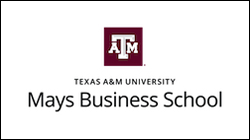Shaping Tomorrow’s Leaders: How Texas A&M University’s Mays Business School Is Preparing Students for Career Success With In-Demand Skills
Critical thinking (79% of employers), problem solving (74%), and written communication (77%) have consistently been ranked by employers as the most in demand skills in today’s workforce (Finley, 2023) and are also vital to academic success.
To ensure its students are well-equipped with these essential, higher-order skills, Texas A&M University’s Mays Business School (MBS) partnered with the Council for Aid to Education (CAE) to implement its Critical Thinking Skills Program—a comprehensive approach to workforce readiness that combines assessment, instructional resources, and ongoing professional development.
Now entering its fifth year, MBS’s Critical Thinking Skills Program has grown significantly in scale and impact:
- All entering undergraduate business students (~1,200 per year) receive instruction in CAE’s Critical Thinking Skills Framework, which outlines seven steps for effective critical thinking. By the end of 2025, more than 6,000 students will have been trained in this framework.
- MBS and CAE co-developed 10 critical thinking practice modules that are embedded in core courses and used by approximately 1,400 students annually. Most students engage with multiple modules over the course of their undergraduate studies.
- Building on its undergraduate success, the program has now expanded into the MBS graduate school where the Critical Thinking Skills Program will be implemented across multiple tracks.
- MBS uses CAE’s Collegiate Learning Assessment (CLA+) to measure student growth. Results allow MBS to evaluate skill development at both the individual and cohort levels.
- MBS faculty have participated in CAE-led critical thinking skills professional development workshops. Faculty learn the importance of critical thinking skills based on CAE’s research and how to embed critical thinking skills instruction and practice into their courses. Early adopters have become champions of the Critical Thinking Skills Program—encouraging broader faculty engagement and deeper integration of critical thinking skills into the curriculum.
- A preliminary efficacy study shows statistically significant improvement in MBS graduate students’ skills with higher levels of curricular instruction. Proportionally more students were in CAE’s top two Mastery Levels—Accomplished and Advanced—and fewer students were below Proficiency.
- A new curriculum design launching this fall will embed critical thinking instruction into all core courses, reflecting MBS’s commitment to preparing future-ready graduates.
- Future research will investigate students’ retention of these skills and the relationship between higher proficiency in these skills and career outcomes.
Interested in how CAE’s Critical Thinking Skills Program can support your faculty and help your students develop the in-demand skills needed for workforce success? Let’s talk!
Finley, A. P. (2023). The career-ready graduate: What employers say about the difference college makes. American Association of Colleges and Universities.
